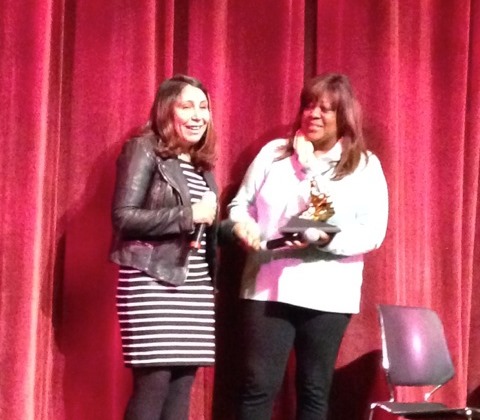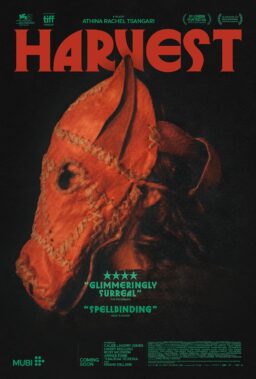On Day Four of Ebertfest this year, an eleven o’clock screening of Haifaa Al-Mansour’s “Wadjda” won over eager viewers and launched a marathon four-movie schedule, and what a successful start it was.
Chaz Ebert introduced Al-Mansour as the first female filmmaker of Saudi Arabia, famous for “penetrating the wall of silence” about the “sequestered lives” of the women of Saudi Arabia. Calling Al-Mansour to the stage, she expressed great joy and privilege for this particular event. As she approached the podium, Al-Mansour received thunderous applause in the almost packed house. She thanked the audience for celebrating foreign films. She introduced the film as a story of victory and the love of life.
It is a charming story. A fiercely determined tween on a mission to purchase a bicycle, so she can out race her neighbor, Abdullah. She must contend with tribal customs, inconsistently practiced religious traditions, and the law in the process.
Having seen this film multiple times with various groups, this was my second viewing in a mostly non-Arab, non-Muslim crowd. In my first experience, the jokes were lost on the attendees. Here, however, the spectators laughed, as though cued by each shot in the film. I have to admit there were times I was laughing at many of the inside jokes (about Arab or Muslim life), so in the Ebertfest crowd I was frequently laughing alone.
But, this film is no mere comedy. It’s a very blunt social commentary on the plight of girls and women in the Kingdom. At times satire, at times drama, it is filled with moments that are both brutal and heartwarming. Ultimately, however, it is a tale of hope: a live-action Disney princess film, where the star is a young middle-class girl in a small suburb of Riyadh.
This film is profound and complex enough that, despite seeing it half a dozen times, I keep discovering new elements, threads, and moments. In previous screenings, I appreciated the stark differences between public and private space. In other settings, it was the way oppressive systems get embodied by otherwise innocent participants, who go on to impose them on others. Or, the film stands out for its depictions of the clash between civil society and tribal structures, where the latter provided obligations and protections that were useful in a pre-modern environment, but repress their citizens in a modern nation state. This time, I watched Wadjda get blocked repeatedly from literally everyone in her circles, including video games, informing her she cannot do what she wants. Even her friend Abdullah keeps obstructing her.
And, that sentiment was at the heart of Al-Mansour’s Q&A session with Michael Barker, which began with a standing ovation. He expressed his admiration for such a quiet, shy, yet increasingly eloquent artist. As the eighth child among twelve siblings, she told her father she wanted to be an astronaut, to which he responded telling her she has to study hard to earn it. Other women are not as fortunate to have such support, so they succumb. She went on to speak of the great tragedy of the lives of so many Saudi women, that they illustrate brilliance and ambition, and eventually give up everything to conform to the heavy pressures of local life. Her goal with this film was to call on them to pursue their dreams.
Another strong point in Al-Mansour’s responses to the questions was that she chose not to make an exploitative film. In my “Far Flung Correspondent” essay on the film, I complain about our thirst for such films, trying to peep behind the veil. She, however, chose to avoid playing the victim, though previous drafts of her script may have seemed to the contrary. She credits her husband (who was present in the audience with their child) for helping her discover her voice, through multiple drafts, leading to what is a very even-handed final product.
Perhaps the most promising news is that her film launched dialogue across this nation that has no movie theaters, but many television dramas. Unlike other artists in her position, she clearly loves her homeland and hopes to rescue it. We hope she makes more excellent films.












